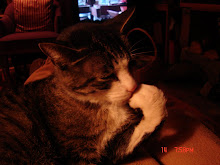Tante Ina was a very unlikely candidate for heroism. She was certainly strong and could be noble, but she saw herself as deeply flawed. Ina was born with a hair lip, a family defect, that was underlined by her parents when she was named after my Oma's sister Clazien who also had a hair lip. Needless to say, the aunt and niece did not like one another. To be so scarred in those days meant certain spinsterhood. Realizing that at an early age, Ina devoted herself to a career and education, becoming a language teacher. Her specialty was German, as well as English and French. She could slip smoothly from one language into another. She was a good and respected teacher but poorly understood by her mostly male colleagues. High school and college level education was male stronghold in the early forties. Ina was an unappealing intellectual woman, an interloper.
During the occupation, she volunteered to be a negotiator for the release of arrested academics. Tall and stately, her bearing, dignity and skill with the German language took her into Nazi headquarters regularly. I can understand the respect the Nazis had for her. Ina was no game player. Since she didn't believe she had sex appeal, she used her class and intellect to impress. The German high-command was very class conscious. She must have been good because she got people released. I'm sure her patronizing male colleagues were more than pleased to let her take those risks. And risks there were. My Oma used to say that whenever Ina went into Nazi headquarters, she never knew if she would come out again. If Ina was afraid, she never let on.
What drove Ina to take those risks and stand so firm? There was one seminal event that could explain it. In the early forties when the occupation was still young, the Nazis began the systematic ghettoization of Holland's Jews. There was a big Jewish population in the cities, many of whom had arrived in 1938 and 39, from Austria, Germany and points east believing that Holland would stay neutral. After the 1938 Crystal Nacht, Jews in Germany who had the means to flee, did. Dutch Jews were very assimilated and had never experienced life in a Ghetto. Tante Ina was assigned to teach in the Ghetto elementary school in Amsterdam. She worked in consultation with the Rabbis to deliver a religiously sensitive curriculum.Very unusual for the time. She enjoyed teaching the Jewish children. She enjoyed their intellectual curiosity and grew to love her charges.
On weekends she travelled home to Den Haag and would return to Amsterdam on Monday mornings. One Monday morning on a beautiful day she arrived at the school to prepare for the day. There was not a soul in sight. It was eerily still. No children's voices, nor running feet and no laughter. Just empty streets and a silent school yard. She spotted the janitor and asked, "where is everyone?" He gave her a startled look and said "oh my God, nobody told you? They took them away last night". Ina asked in horror, "even the children?" "Everyone" he replied.
It was such a shocking experience, that years later as an old lady with Alzheimer's, she would tell and retell this story with tears streaming down her face. "I should have done more" she would say.
It was that event that decided my Tante Ina to join the Dutch Resistance.
skip to main |
skip to sidebar

Facebook Badge
About Me

- kingmisha
- I'm bigger than a pile of breadboxes, but smaller than a Sherman tank. I'm overeducated, underpaid but very content with my life. I have loved infrequently but intensely. I dated a poet, divorced a Dean, had an affair with a jazz pianist, was engaged to a diplomat, and widowed by my child's father. The men in my life were all very special. Not all grand passions but much loved in their time: Leonard Cohen, Alfred Pinsky, Billy Horn, Wendell Goodin, and Elliot Hirschman. Thanks for the memories... I'm a lapsed artist which doesn't really trouble me because I'm a very successful parent. I lacked the requisite conceit to persevere as an artist. I just couldn't make myself believe that my art came before my child. The world really doesn't need another sculptor (even a good one), but it does need another good human being. It can use all the good human beings we can turn out. I present Mambolica as my evidence so judge for yourselves.
